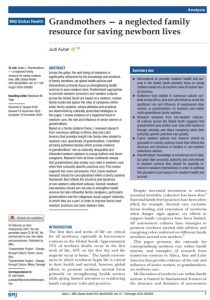
Across the globe, the well-being of newborns is significantly influenced by the knowledge and practices of family members, yet global health policies and interventions primarily focus on strengthening health services to save newborn lives. Predominant approaches to promote newborn survival in non-western cultures across the Global South are based on a western, nuclear family model and ignore the roles of caregivers within wider family systems, whose attitudes and practices are determined by culturally prescribed strategies. In this paper, [the author reviews] evidence of a neglected facet of newborn care, the role and influence of senior women or grandmothers.
Summary
- Interventions to promote newborn health and survival in the Global South primarily focus on young mothers based on a Eurocentric view of nuclear family structure.
- Evidences from studies in numerous cultural contexts across Africa, Asia and Latin America reveal the significant role and influence of experienced older women, or grandmothers, on newborn care within multi-generational family systems.
- Research reviewed from non-western collectivist cultures across the Global South suggests that grandmothers play similar core roles with newborns through advising and direct caregiving while their culturally specific practices vary greatly.
- Future newborn policies and research should be grounded in a family systems frame that reflects the structure and dynamics of families in non-western collectivist cultures.
- Grandmothers’ knowledge is sometimes out of date, but given their proximity, authority and commitment to newborn survival they should be explicitly involved in newborn interventions in order to optimise this abundant local resource for newborn health and survival.